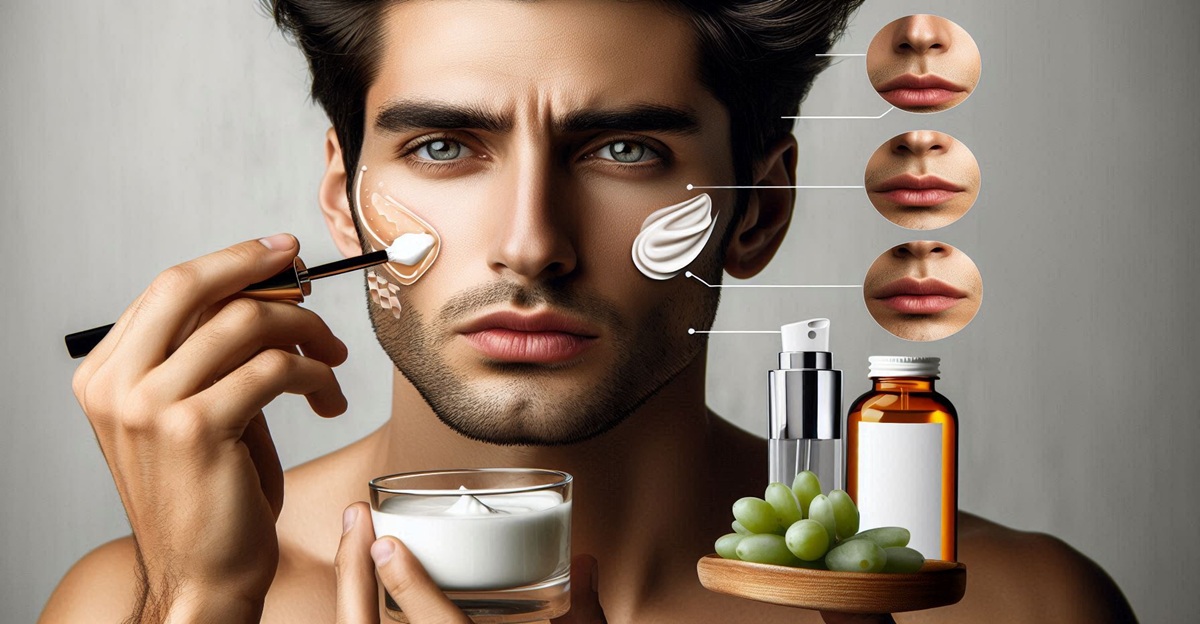Aging—it happens to the best of us. But to really tackle it, understanding how it works is key. The skin’s journey of aging starts with two main stars: collagen and elastin. These proteins are the heavy lifters, keeping your skin firm and bouncy. As birthdays come and go, these proteins start to break down, leading to those fine lines we all love to hate.
Another piece of the puzzle is hydration. Our skin loses its mojo of holding onto moisture as we age. The result? Dryness and a lackluster look—not ideal when you’re aiming for that youthful glow. Add the slowdown in skin cell turnover, and you’ve got a recipe for visible aging.
External factors can speed things up drastically. Constant exposure to the sun’s UV rays is like adding fuel to the aging fire. It damages the skin at a cellular level, promoting wrinkles and spots. But hey, it doesn’t stop there. Pollution, smoking, and even daily stress can contribute to premature aging, making lifestyle choices as crucial as your skincare routine. So, what’s the takeaway? Protect your skin from environmental factors, and understand what’s happening beneath the surface.
Crafting an Engaging Anti-Aging Skincare Routine
Building a skincare routine isn’t just slapping on random products. It’s an investment in your skin’s future, one day at a time. Let’s talk mornings. Start with a good cleanse. Wash away nighttime oils and get your face prepped for the day ahead.
Antioxidants are your skin’s superhero in the morning. A Vitamin C serum can be your best bet—it’s like a shield against nasty free radicals caused by pollution and UV radiation.
Then comes sunscreen. Ask any expert, and they’ll tell you it’s the most crucial step. SPF is non-negotiable. It prevents sun damage, which, as we know, is a fast track to wrinkles.
Evenings are all about repair. Start with double cleansing; it makes sure all makeup and grime are truly gone. An oil-based cleanser followed by a foaming one gets the job done. As for retinoids, they boost cell turnover. These gems help reduce fine lines while you sleep.
Did someone say hydration? Night creams or overnight masks seal the moisture in, helping your skin max out on repair time. Weekly, think of exfoliation. Both chemical and physical options can refresh your skin and keep it smooth. And for masks? Look for ingredients like peptides and hyaluronic acid for that spa-day glow.
Leveraging Essential Ingredients for Lasting Youth
Let’s dive into the ingredients that back up these anti-aging promises. Retinoids are often seen as the gold standard. They crank up collagen production and help smooth out the skin’s texture. If you want those fine lines to take a back seat, retinoids are your ticket.
Hyaluronic acid doesn’t just sound high-tech; it’s a moisture magnet. This ingredient can hold up to a thousand times its weight in water, making it essential for keeping that skin plump and supple. Use it regularly, and you’ll see why it’s a staple in hydrating products.
Peptides are like the builders of your skin. They sneak into your routine and help promote collagen growth, firming things up naturally over time. Perfect for anyone aiming for a bouncier complexion.
Got antioxidants on your radar? They’re essential for fighting off the daily assault of free radicals. Ingredients like Vitamins C and E act like a force field for your face, reducing damage and keeping those youthful vibes going strong.
Implementing Lifestyle and Mindset Changes for Holistic Anti-Aging
Youthful skin isn’t just about what you smear on your face. It’s about treating your whole body right. Start with fueling your skin from the inside. Foods rich in antioxidants, like berries and leafy greens, are fantastic allies in the fight against aging.

Hydration is a game-changer. Drinking enough water keeps your skin cells plump, flushes out toxins, and contributes to that glowing complexion we all crave.
Managing stress might be trickier, but it’s vital. High-stress levels can trigger cortisol, a hormone that can wreak havoc on your skin. Find what helps you relax—whether it’s yoga, meditation, or even a good laugh with friends.
Then there’s sleep. Quality shut-eye is when your skin goes into overdrive repair mode, so make sure to catch those precious Zs. Stick to a consistent sleep schedule to give your body and skin the chance to rejuvenate and refresh each night.
Common Mistakes to Avoid in Anti-Aging Skincare
Avoiding common missteps can help you maximize your skincare routine. Over-exfoliating might seem like a good idea, especially if you want to get rid of dead skin cells, but it can actually harm your skin barrier. This delicate layer protects against environmental nasties and keeps moisture in, so treat it gently.
Skipping sunscreen is a cardinal sin in the world of anti-aging. Even if it’s cloudy, UV rays can still damage your skin. Regular SPF wear is crucial for keeping your skin looking youthful. However, make sure to use an all-natural sunscreen, as many sunscreens contain harmful cancer-causing substances.
Patch testing new products may seem like a hassle, but it can prevent unpleasant reactions. A small dab on your wrist or behind your ear before slathering it all over your face is a smart precaution.
Believing that more expensive products are always better can drain your wallet without delivering real results. Sometimes, budget-friendly options contain the same effective ingredients. It’s all about knowing what to look for and picking products that work best for your skin type.
Finally, thinking that your anti-aging routine will instantly erase wrinkles can lead to disappointment. These products and habits help slow down and improve the aging signs, but they aren’t a time machine. Patience and consistency will reward you with the best results over time.
Keith Stieneke is a health and wellness enthusiast and the founder of YouthRenewalSource.com. With a passion for helping others discover practical anti-aging solutions, Keith combines scientific insights and personal experience to create content that empowers readers to lead vibrant lives.


I found the blog post “Top Anti-Aging Skincare Routines That Work” on Youth Renewal Source quite insightful. The emphasis on understanding the roles of collagen and elastin in maintaining skin firmness and elasticity was particularly enlightening. I also appreciated the detailed breakdown of morning and evening skincare routines, highlighting the importance of antioxidants like Vitamin C in the morning and retinoids at night. The discussion on lifestyle factors, such as diet and stress management, underscored a holistic approach to skincare. I’m curious, could you elaborate more on how specific foods rich in antioxidants directly impact skin aging? Are there particular dietary recommendations or foods to avoid to enhance the effectiveness of an anti-aging skincare regimen?
Hello Hanna,,
Thank you for your thoughtful comment on the blog post “Top Anti-Aging Skincare Routines That Work.” I am happy that you found the post insightful and that the sections on collagen, elastin, and the importance of antioxidants resonated with you.
I’m glad you appreciated the detailed morning and evening skincare routines! Vitamin C and retinoids are indeed game-changers, and I love how they work in tandem to protect and renew the skin. It’s also wonderful to hear that the holistic approach we emphasized—like diet and stress management—stood out to you. After all, great skincare is about nurturing the skin from inside and out.
To answer your question, foods rich in antioxidants, such as berries, leafy greens, nuts, and dark chocolate, play a key role in combating oxidative stress caused by free radicals. Free radicals can break down collagen and elastin over time, leading to premature aging. By incorporating these antioxidant-rich foods, you’re essentially arming your skin with a protective shield, helping to maintain its elasticity and glow.
For dietary recommendations, I suggest focusing on foods rich in Vitamins A, C, and E, as well as omega-3 fatty acids. Think sweet potatoes, citrus fruits, almonds, and fatty fish like salmon. At the same time, it’s important to limit or avoid processed sugars and trans fats, as they can accelerate glycation—a process that damages collagen and contributes to wrinkles.
Thank you again for your kind words and engaging questions. I’ll consider diving deeper into this topic in a future post, so stay tuned! Wishing you all the best on your anti-aging journey.
Warm regards,
Keith
This post is packed with practical tips for fighting the signs of aging, and I love how it breaks everything down into manageable steps. The importance of antioxidants like Vitamin C in the morning and retinoids at night really stood out to me. I also appreciate the emphasis on a holistic approach, like managing stress and eating the right foods, which is something people often overlook. It’s refreshing to see advice that not only focuses on skincare but also on the lifestyle factors that support healthy skin. I’ll definitely be incorporating some of these tips into my routine! -Maksim V 🙂
Hi Maksim,
Thanks for your comment. I’m glad that you found the tips helpful and practical. You’re right—skincare is just one piece of the puzzle. Focusing on lifestyle factors like nutrition, stress management, and sleep can make a huge difference in supporting healthy, glowing skin.
I’m glad the points about antioxidants and retinoids resonated with you—they’re such powerful tools when used consistently. If you have any questions as you start implementing these tips or would like to share how they work for you, I’d love to hear from you!
Wishing you all the best on your journey to healthy, youthful skin! 😊
Warm regards,
Keith
Interesting article.
Based on your article you have mentioned Hyaluronic acid helps with skin plumping.
Is it suitable for all skin types? I have oily and acne prone skin and i am scared of aggravating it.
If suitable what do you recommend to be the best way to incorporate hyaluronic acid into a skincare routine?
Hello Clair,
Thanks for your comment! I’m glad you found the article interesting.
Hyaluronic acid (HA) is generally suitable for all skin types, including oily and acne-prone skin. It is a humectant, drawing moisture into the skin without clogging pores or making skin greasy. Proper hydration can help balance oil production, which may benefit acne-prone skin.
To incorporate hyaluronic acid into your skincare routine:
Apply on damp skin – After cleansing, apply HA serum while your skin is still slightly damp to lock in moisture.Layer with a lightweight moisturizer – Follow up with an oil-free, non-comedogenic moisturizer to help seal in hydration.Use it twice daily – Morning and night applications can help keep your skin hydrated and plump.Pair with a gentle routine – Avoid harsh, drying ingredients that may strip the skin, leading to increased oil production.
If you have concerns, it’s always best to patch-test a new product and consult a dermatologist for personalized advice. Let me know if you have any other questions! 😊
Sincerely,
Keith
An avid researcher of health and wellness-related information.